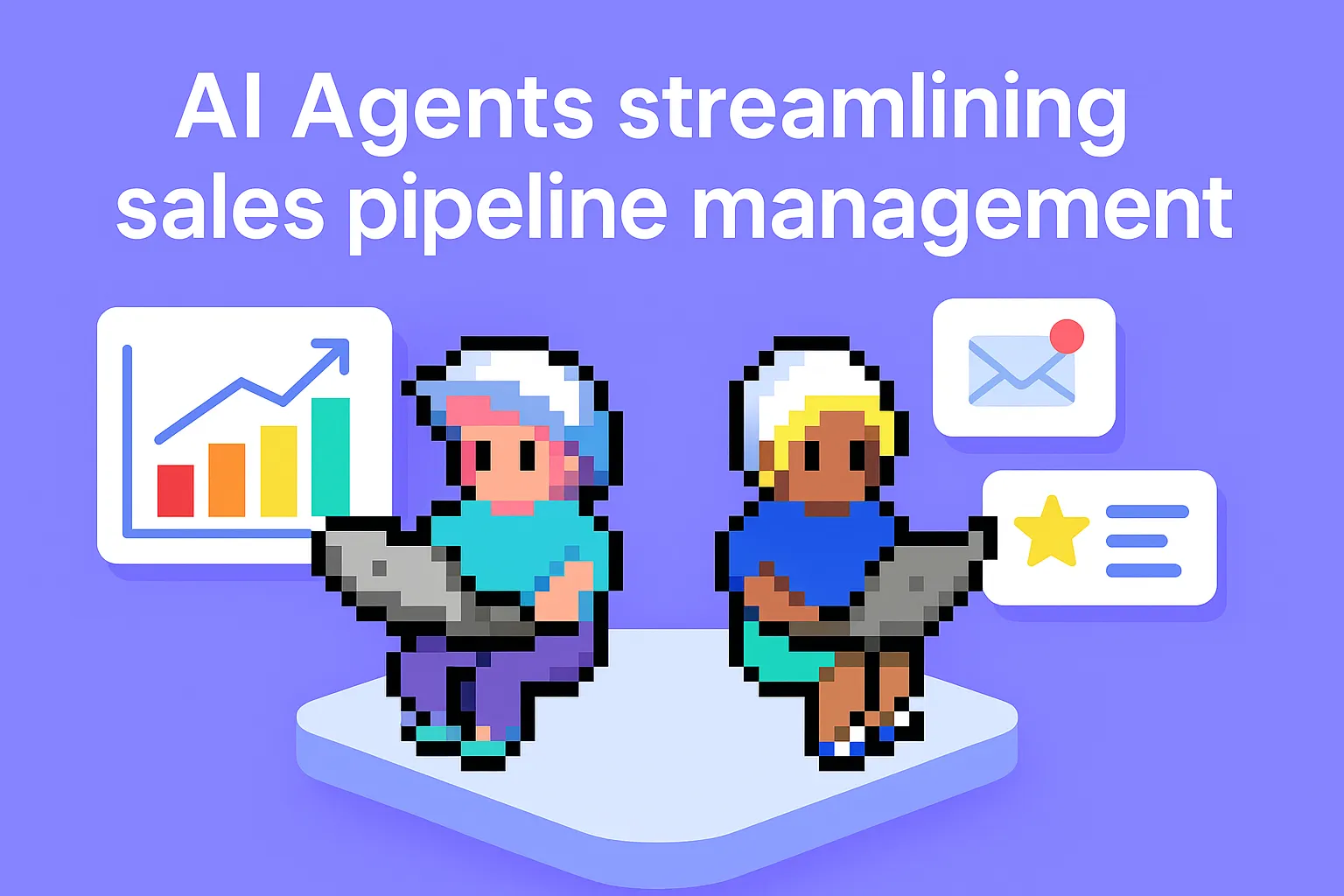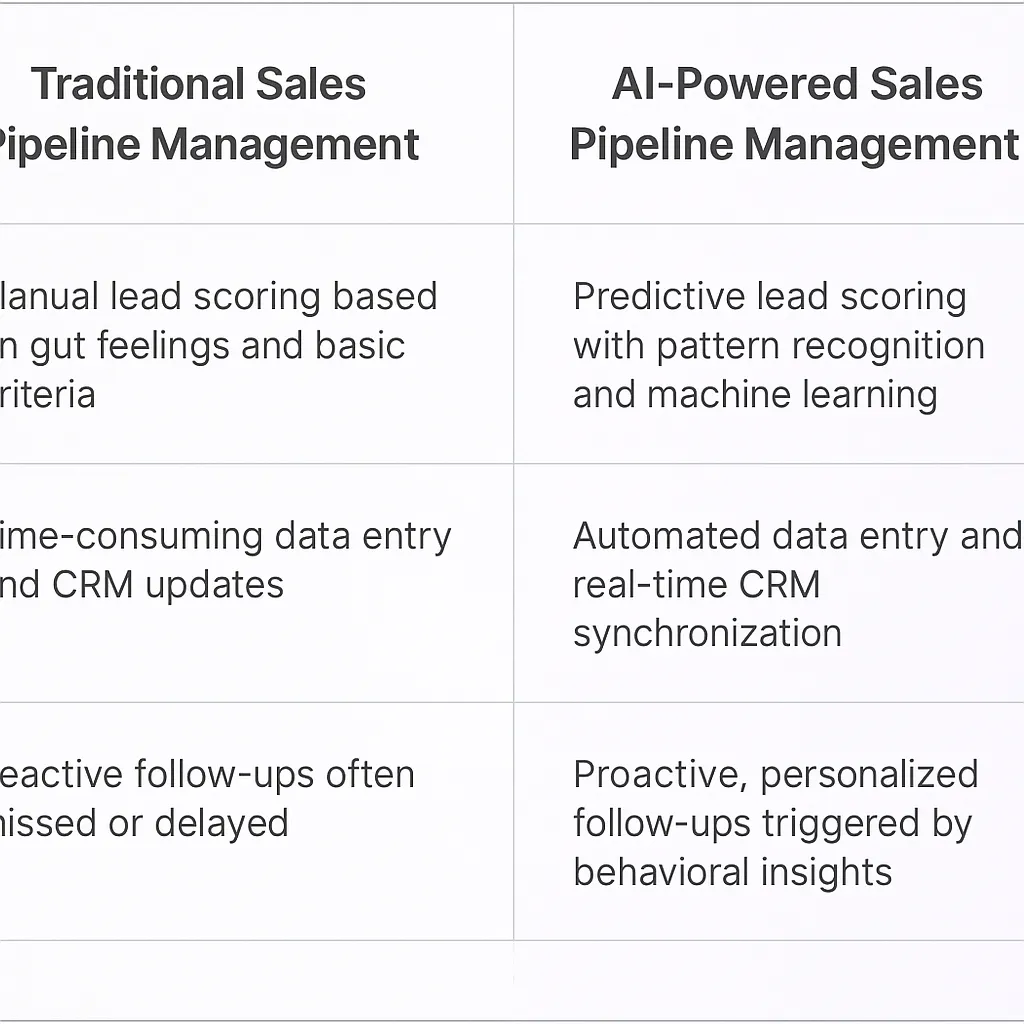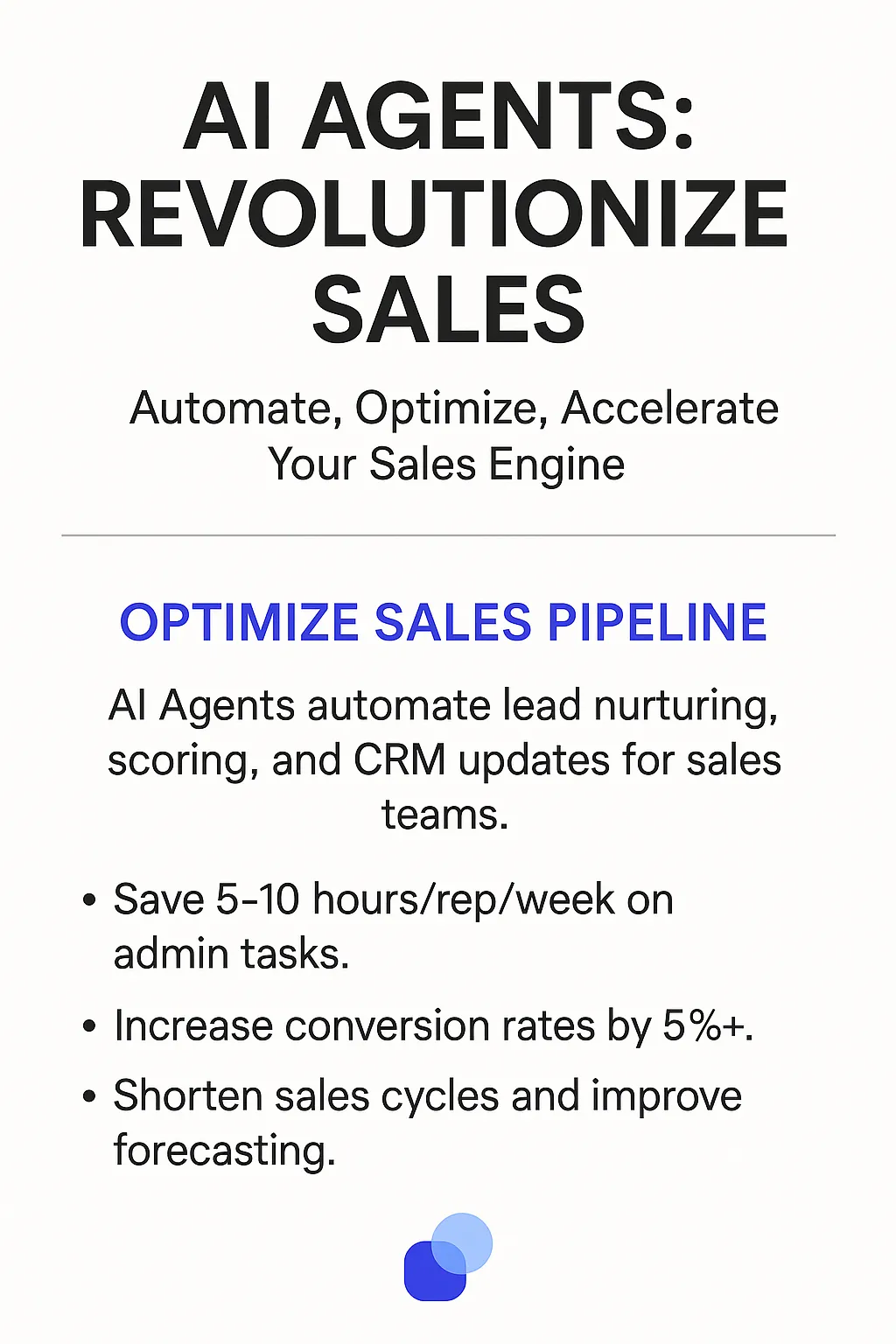Sales Pipeline Management AI Agents
The Evolution of Sales Pipeline Management with AI
Sales pipeline management is the strategic process of tracking and analyzing potential sales opportunities as they progress through various stages of the sales cycle. It's the backbone of any effective sales operation, allowing teams to forecast revenue, allocate resources, and optimize their approach to closing deals. In the past, this was a largely manual process, relying on human intuition and basic CRM tools. But now, AI is changing the game.
The core features of sales pipeline management include lead tracking, deal stage progression, forecasting, and performance analytics. With AI agents, these features are supercharged. AI-powered pipeline management offers predictive lead scoring, automated follow-ups, real-time insights, and personalized engagement strategies. It's not just about managing a pipeline; it's about optimizing every aspect of the sales process with data-driven precision.

Benefits of AI Agents for Sales Pipeline Management
What would have been used before AI Agents?
Before AI agents entered the scene, sales teams were stuck in a quagmire of manual processes and gut feelings. They'd rely on clunky CRM systems, endless spreadsheets, and the "instincts" of seasoned sales reps. It was like trying to navigate a complex maze blindfolded, with only occasional shouts from colleagues to guide you.
Sales managers would spend hours poring over data, trying to forecast which deals might close and which were likely to slip through the cracks. It was a time-consuming, error-prone process that often led to missed opportunities and inefficient resource allocation.
What are the benefits of AI Agents?
Enter AI agents for sales pipeline management, and suddenly it's like someone turned on the lights in that maze. These digital teammates are game-changers, offering a level of insight and efficiency that human-only teams could only dream of.
First off, AI agents excel at pattern recognition. They can analyze vast amounts of historical data to identify the characteristics of deals that are most likely to close. This isn't just surface-level stuff – we're talking about picking up on subtle signals that even the most experienced sales reps might miss. It's like having a sales savant on your team who never sleeps and never forgets.
But it doesn't stop there. These AI agents can prioritize leads with scary accuracy. They're constantly learning from new data, refining their models, and getting better at predicting which prospects are worth pursuing. This means your sales team can focus their energy where it matters most, instead of chasing lukewarm leads down rabbit holes.
Perhaps most impressively, AI agents can provide real-time insights and recommendations. Imagine a digital teammate that can tell you, "Hey, based on the last 10,000 similar deals, you should follow up with prospect X in the next 48 hours to increase your close probability by 35%." That's not science fiction – that's the reality of what these AI agents can do.
And let's talk about personalization. AI agents can analyze a prospect's behavior, preferences, and history to suggest the most effective communication strategies. It's like having a mind-reader on your team, helping you tailor your pitch to each individual prospect.
The result? A sales pipeline that's not just managed, but optimized. Teams using AI agents are seeing shorter sales cycles, higher close rates, and more accurate forecasting. It's not about replacing human salespeople – it's about augmenting their capabilities and letting them focus on what they do best: building relationships and closing deals.
In the end, AI agents for sales pipeline management aren't just tools – they're transformative technologies that are redefining what's possible in sales. And for companies that embrace them, the future looks very bright indeed.

Potential Use Cases of AI Agents with Sales Pipeline Management
Processes
AI agents are reshaping sales pipeline management in ways we couldn't have predicted even a few years ago. They're not just tools; they're digital teammates that can transform how sales teams operate. Let's dive into some key processes where these AI agents are making waves:
- Lead Scoring and Prioritization: AI agents can analyze vast amounts of data to score leads based on their likelihood to convert. They're constantly learning from past interactions, making their predictions increasingly accurate over time.
- Deal Stage Progression: These digital teammates can track deal progress and suggest optimal times to move deals to the next stage, reducing pipeline stagnation.
- Sales Forecasting: By crunching numbers and identifying patterns, AI agents can provide more accurate sales forecasts, helping teams set realistic goals and allocate resources effectively.
- Customer Engagement Tracking: AI can monitor customer interactions across various touchpoints, providing a holistic view of engagement levels throughout the sales process.
Tasks
When it comes to specific tasks, AI agents are proving to be invaluable allies for sales teams. Here are some game-changing ways they're being put to work:
- Automated Follow-ups: AI agents can draft and send personalized follow-up emails based on the prospect's behavior and stage in the pipeline, ensuring no lead falls through the cracks.
- Meeting Scheduling: These digital teammates can handle the back-and-forth of scheduling, finding optimal times that work for both the sales rep and the prospect.
- Data Entry and CRM Updates: AI can automatically update CRM records with new information from emails, calls, and meetings, freeing up reps to focus on selling.
- Competitive Intelligence Gathering: AI agents can scour the web for information about competitors and market trends, providing sales reps with valuable insights for their pitches.
- Proposal Generation: By analyzing successful past proposals and current deal specifics, AI can assist in creating tailored, compelling proposals faster than ever before.
The integration of AI agents into sales pipeline management isn't just an incremental improvement - it's a paradigm shift. These digital teammates are augmenting human capabilities, allowing sales teams to operate at a level of efficiency and effectiveness that was previously unattainable. As these AI agents continue to evolve, we're likely to see even more innovative use cases emerge, further transforming the sales landscape.

Industry Use Cases: AI Agents in Sales Pipeline Management
AI agents are reshaping sales pipeline management across industries, offering a level of precision and insight that was once unimaginable. These digital teammates aren't just tools; they're becoming integral parts of sales teams, working alongside humans to drive results. Let's dive into some specific industry use cases that showcase how AI is transforming the sales landscape.
From tech startups to Fortune 500 companies, businesses are leveraging AI to gain a competitive edge in their sales processes. These AI agents are like having a team of data scientists, market analysts, and sales strategists working 24/7 to optimize every stage of the pipeline. They're not replacing human intuition and relationship-building skills, but rather augmenting them with data-driven insights and automation of repetitive tasks.
What's particularly exciting is how these AI agents are adapting to the unique challenges and opportunities in different sectors. Whether it's predicting customer behavior in retail, qualifying leads in B2B software sales, or managing complex, long-cycle deals in manufacturing, AI is proving to be a game-changer. The following use cases will give you a taste of how AI is being deployed on the front lines of sales across various industries.
Real Estate: Elevating Deal Flow with AI-Powered Pipeline Management
The real estate industry is ripe for disruption, and AI-powered sales pipeline management is the secret weapon that top-performing brokerages are wielding to crush their competition. Let's dive into how these digital teammates are transforming the way real estate professionals hustle deals from lead to close.
First off, these AI agents are like having a 24/7 deal radar. They're constantly scanning multiple data sources – MLS listings, public records, social media chatter – to identify potential sellers before they even list. This isn't your grandma's lead gen; we're talking about predictive analytics that can spot a "For Sale" sign before it hits the lawn.
But the real magic happens in nurturing these leads. AI agents are personalizing outreach at scale, crafting messages that resonate with each prospect's unique situation. They're not just blasting generic emails; they're having nuanced conversations about market trends, property values, and timing – all tailored to the individual's needs and preferences.
As deals progress, these digital teammates become invaluable pipeline managers. They're tracking every interaction, document, and deadline across dozens or even hundreds of active deals. No more deals slipping through the cracks because an agent forgot to follow up. The AI is on it, sending timely reminders and flagging potential roadblocks before they derail a sale.
Here's where it gets really interesting: these AI agents are learning and improving with every deal. They're identifying patterns in successful transactions and applying those insights to optimize future deals. It's like having a seasoned mentor guiding every decision, but one that's powered by data from thousands of transactions.
The result? Real estate pros using these AI-powered pipeline management tools are closing more deals, faster, and with higher satisfaction on both sides of the transaction. They're spending less time on admin and more time building relationships and closing deals. It's not just an incremental improvement; it's a step-change in how real estate business gets done.
As this technology matures, we're going to see a widening gap between the AI-empowered agents and the old-school holdouts. The future of real estate belongs to those who embrace these digital teammates as essential partners in their success. It's not about replacing human expertise; it's about augmenting it to create superhuman performance in a hyper-competitive market.
Manufacturing: AI-Driven Sales Pipeline Optimization
The manufacturing sector is undergoing a seismic shift, and AI-powered sales pipeline management is the catalyst. These digital teammates are redefining how industrial equipment and supplies are sold, creating a new playbook for success in a traditionally relationship-driven industry.
At the core, these AI agents are data-crunching powerhouses. They're ingesting and analyzing vast amounts of information - from equipment usage patterns and maintenance schedules to market trends and economic indicators. This isn't just about predicting when a customer might need a replacement part; it's about anticipating entire facility upgrades before the client even realizes they're necessary.
The real game-changer is in how these AI agents are reshaping the sales conversation. They're not just scheduling follow-ups; they're orchestrating multi-touch, multi-channel engagement strategies that feel personal and timely. Imagine an AI that knows when to send a technical spec sheet, when to suggest a site visit, and when to loop in the CFO with a detailed ROI analysis - all based on the prospect's behavior and the typical buying patterns in their specific manufacturing niche.
As deals progress, these digital teammates become invaluable strategic advisors. They're not just tracking pipeline stages; they're providing real-time insights on win probabilities, suggesting optimal pricing strategies, and even recommending cross-sell opportunities based on the prospect's entire manufacturing ecosystem. It's like having a seasoned sales director and a data scientist rolled into one, guiding every move.
But here's where it gets really interesting: these AI agents are learning from every interaction across the entire sales team. They're identifying which pitch decks resonate with automotive manufacturers versus aerospace, which negotiation tactics work best for long-term contracts, and even which salespeople are most effective with certain types of buyers. It's creating a collective intelligence that elevates the entire sales organization.
The impact? Manufacturing sales teams leveraging these AI-powered tools are seeing shorter sales cycles, higher close rates, and significantly larger deal sizes. They're spending less time on prospecting and more time on high-value consultative selling. It's not just an efficiency play; it's fundamentally changing the nature of industrial sales.
As this technology evolves, we're going to see a growing divide between manufacturers who embrace AI-driven sales processes and those who don't. The winners will be those who recognize these digital teammates not as tools, but as integral members of their sales ecosystem. It's not about replacing the handshake deal; it's about empowering sales teams to build deeper, more strategic relationships at scale.
The future of manufacturing sales belongs to those who can blend the art of relationship-building with the science of AI-driven insights. And trust me, that future is coming faster than most in the industry realize.
Considerations
Technical Challenges
Implementing a Sales Pipeline Management AI Agent isn't just about plugging in some fancy algorithm and watching the magic happen. It's a complex beast that requires serious technical chops and a deep understanding of both AI and sales processes.
First off, data integration is a major hurdle. Your AI agent needs to pull data from multiple sources - CRM systems, email communications, call logs, and even social media interactions. Getting all these disparate systems to play nice together is like herding cats. You'll need robust APIs and data pipelines that can handle real-time updates without breaking a sweat.
Then there's the challenge of data quality. Garbage in, garbage out, as they say. Sales data is notoriously messy, with inconsistent formats, duplicate entries, and human errors galore. Your AI agent needs to be smart enough to clean, normalize, and make sense of this data soup. This isn't just a one-time cleanup; it's an ongoing battle against data entropy.
Machine learning model selection and training is another technical minefield. Do you go with a supervised learning approach for predicting deal outcomes? Or maybe an unsupervised model for segmenting leads? Each choice comes with its own set of trade-offs in terms of accuracy, interpretability, and computational resources.
Operational Challenges
On the operational side, things get even trickier. You're not just deploying a tool; you're fundamentally changing how your sales team operates. This is where the rubber meets the road, and where many AI implementations crash and burn.
User adoption is the first big hurdle. Sales reps are creatures of habit, and they've got their own systems that have worked for them (or so they believe). Convincing them to trust an AI agent with their precious pipeline is like asking a chef to let a robot season their signature dish. You need a rock-solid change management strategy, complete with training programs, incentives, and a lot of hand-holding.
Then there's the question of how to integrate the AI's insights into existing sales processes. Do you let the AI make autonomous decisions, or use it as an advisory tool? How do you balance the AI's recommendations with human intuition and relationship-building skills? These aren't just technical decisions; they're philosophical ones that can make or break your sales culture.
Privacy and ethical considerations are another can of worms. Your AI agent will be privy to sensitive customer information and internal sales strategies. How do you ensure data security and compliance with regulations like GDPR? And what about the ethical implications of using AI to influence sales tactics? You need to tread carefully to avoid crossing the line into manipulative territory.
Lastly, there's the challenge of continuous improvement. An AI agent isn't a set-it-and-forget-it solution. It needs constant monitoring, tweaking, and retraining to stay effective. This requires a dedicated team of data scientists and engineers working in close collaboration with sales leadership. It's a long-term commitment, not a quick fix.
Implementing a Sales Pipeline Management AI Agent is a journey fraught with technical and operational pitfalls. But for those who can navigate these challenges, the potential rewards in terms of increased sales efficiency and effectiveness are enormous. It's not for the faint of heart, but then again, neither is building a successful startup.
The AI Revolution in Sales: Empowering Teams and Driving Results
AI agents are not just enhancing sales pipeline management; they're redefining it. From real estate to manufacturing, these digital teammates are driving unprecedented efficiency and effectiveness in sales processes. They're turning vast amounts of data into actionable insights, automating tedious tasks, and allowing sales teams to focus on what they do best: building relationships and closing deals. As AI technology continues to evolve, we can expect even more innovative applications in sales pipeline management. The future of sales belongs to those who can effectively harness the power of AI to augment human capabilities and drive results. It's not about replacing salespeople; it's about empowering them to perform at superhuman levels. The AI revolution in sales is here, and it's just getting started.













